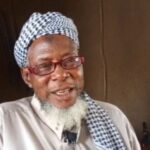The Speaker of the House of Representatives, Hon. Abbas Tajudeen, on Tuesday stressed the need for better border controls, noting that the present porous nature of Nigerian borders exposes the country to eventualities in other West African countries.
Speaker Abbas gave the charge in Abuja while delivering keynote lecture on ‘National Resilience and Security in the 21st Century’, delivered at the Royal College of Defence Studies (RCDS) Engagement with the Nigerian National Defence College, Course 33.
While calling for better socio-economic and security relationships with other countries in the region, the Speaker called for stronger national cohesion within the country.
“For Nigeria, porous borders mean its security is inseparable from that of its neighbours. Continued support for joint patrols, the standby force concept, and regional initiatives, such as grazing corridors, will strengthen resilience across West Africa and at home,” he said.
Speaking on Africa and the Economic Community of West African States, and the regional context of resilience and security, the Speaker noted that national resilience and security are profoundly influenced by regional dynamics in Africa and within the ECOWAS.
He said across the continent, states contend with insurgencies in the Sahel, constitutional crises in Mali, Guinea, Burkina Faso and Niger, economies that depend heavily on commodities, health emergencies such as Ebola and COVID-19, and severe climate impacts.
“Yet African societies consistently demonstrate adaptability, from post-conflict recovery in Rwanda and Sierra Leone to navigating economic hardship. The African Development Bank’s 2022-2026 Strategy emphasises that strengthening institutions, communities, and investments collectively builds shared resilience,” he added.
Speaker Abbas said at the continental level, the African Union’s Peace and Security Architecture — with its early warning systems, mediation efforts, and standby force — alongside initiatives such as the Great Green Wall and ECOWAS drought resilience plans, highlights the need to address security, environmental, and development challenges in a coordinated manner.
The Speaker stressed that ECOWAS has repeatedly acted to contain crises, deploying missions in Liberia, Sierra Leone, and Ivory Coast, and leading the 2017 Gambian intervention to uphold election results under Nigerian leadership.
He said: “A wave of recent coups now tests the sub-region’s commitment to constitutional governance, prompting sanctions, negotiations, and proposals for a dedicated ECOWAS standby force to deter unlawful power seizures.”
The Speaker stated that economic integration measures, such as plans for a common currency, solidarity funds, and coordinated health procurements during the pandemic, further bolster regional stability by facilitating resource flows.
He said: “An effective resilience strategy follows three integrated phases: mitigation, adaptation, and recovery. Mitigation employs proactive measures, such as flood defences, robust building standards, preventive diplomacy, and deradicalization programs, to reduce risks before they occur.
“Adaptation acknowledges that some shocks are unavoidable and builds capacity to cope through drought-resistant crops, emergency communications drills, and diversified energy sources.
“Recovery restores and strengthens communities and systems through relief efforts, infrastructure rebuilding, the reintegration of affected populations, and economic stimulus, while embedding lessons learned to address future vulnerabilities. By treating these phases as a continuous cycle, each recovery informs better mitigation and adaptation, ensuring that past crises guide future security planning.”
Speaker Abbas also highlighted how Nigeria’s key policy frameworks now follow an integrated cycle of mitigation, adaptation, and recovery. He said the National Disaster Management Framework mandates preparedness at every level and a coordinated response and recovery under the National Emergency Management Agency (NEMA), working with local and international partners.
He explained that the National Adaptation Plan provides a long-term roadmap to reduce climate vulnerabilities, while the National Security Strategy unites prevention, protection, and crisis response across all ministries, agencies, and civil society in a whole-of-society model.
“To strengthen this integration, Nigeria could further intensify joint scenario planning and an annual national risk assessment, in which finance, health, agriculture, environment, and defence present shared threat registers and align their mitigation, adaptation, and recovery measures. This is similar to the UK’s National Resilience Framework and its National Risk Register.
“Achieving true resilience also requires political will and resources for less visible prevention work, as well as a culture of preparedness among citizens, businesses, and communities. By preventing what it can, preparing for what it cannot prevent and recovering swiftly from unavoidable shocks, Nigeria can ensure each crisis becomes an opportunity to build a safer, stronger nation,” he said.
The Speaker stated that what emerges clearly is a powerful conclusion that “national resilience and national security are mutually reinforcing and together form the bedrock for addressing the challenges of the 21st Century and safeguarding the welfare of citizens.”
He added, “National strength depends on prevention, endurance, and quick recovery across all sectors to protect and empower citizens. Success is demonstrated by minimal loss and rapid restoration through early warning systems, economic resilience, or cyber defence, along with long-term improvements in health, education, and equity.
“A society-wide approach, supported by strong legislation and citizen engagement, will ensure that our resilience bolsters our security, and our security in turn fosters our resilience, thereby securing Nigeria’s future.”
ALSO READ TOP STORIES FROM NIGERIAN TRIBUNE
WATCH TOP VIDEOS FROM NIGERIAN TRIBUNE TV
- Let’s Talk About SELF-AWARENESS
- Is Your Confidence Mistaken for Pride? Let’s talk about it
- Is Etiquette About Perfection…Or Just Not Being Rude?
- Top Psychologist Reveal 3 Signs You’re Struggling With Imposter Syndrome
- Do You Pick Up Work-Related Calls at Midnight or Never? Let’s Talk About Boundaries






